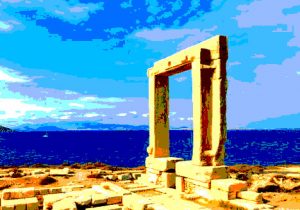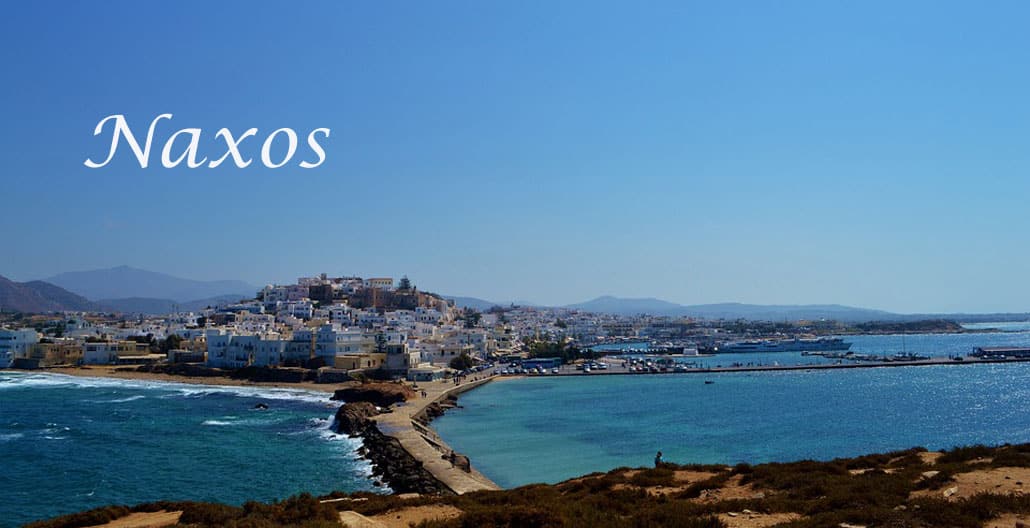A brief introduction to Naxos History

It has always been famous for the great quantity of its quarried marbles, for its emery, for the multitude of its springs, for its abundant gardens, for the beauty of its plains, for its olive-groves and its famous wine. At the same time, because the sea isolates it remained original, unusual, different and self-sufficient.
Dionysos is the god who stands out above all others in relation to Naxos, He was born and raised in Naxos where he married Ariadne after her abandonment by Theseus. Her marriage to the god and her death, which foreshadowed her resurrection, were strongly celebrated on the island because it was related to the rebirth of Nature.
[ez-toc]
Prehistoric Period
The earliest evidence of human presence on Naxos dates back to the Neolithic period (around 4,000 BCE). Archaeological excavations have revealed settlements, tombs, and artifacts from this era. The island was inhabited by a civilization known as the Cycladic people, who left behind distinctive marble figurines and pottery.
Minoan and Mycenaean Periods
During the Bronze Age, Naxos came under the influence of the Minoan civilization of Crete. The Minoans established a trading network in the Aegean, and Naxos played a significant role as a hub for trade and cultural exchange. The island flourished economically and witnessed the construction of impressive buildings and palaces.
In the late Bronze Age, the Mycenaean Greeks began to exert their influence in the Aegean. Naxos became a Mycenaean stronghold, and the island’s prosperity continued. Mycenaean tombs and pottery have been discovered, indicating their presence on the island.
Archaic and Classical Periods
Around the 8th century BCE, Naxos played a prominent role in the expansion of the Greek world. It became a significant center of the Cycladic civilization and established colonies on other islands, including the founding of the first colony in Sicily, named Naxos. The island became a major maritime and commercial power, controlling trade routes and enjoying economic prosperity.
During the Persian Wars in the 5th century BCE, Naxos initially sided with the Persians but later joined the Greek alliance against them. Following the Greek victory, Naxos became a member of the Delian League, an alliance led by Athens. However, Naxos eventually revolted against Athens, seeking independence. The revolt was unsuccessful, and Athens imposed its control over the island.
Hellenistic and Roman Periods
After the death of Alexander the Great, Naxos came under the control of the Ptolemaic Kingdom of Egypt. The island experienced a decline in its influence and power during this period but remained an important center for agriculture and trade.
In 41 BCE, Naxos, along with the rest of the Cyclades, was incorporated into the Roman Republic. The Romans maintained control over the island during the Roman Empire. Several Roman buildings, including a temple dedicated to Apollo, were constructed on Naxos during this time.
Byzantine and Venetian Periods
With the fall of the Western Roman Empire, Naxos came under the control of the Byzantine Empire. The island was frequently raided by barbarian tribes, including the Goths and the Saracens. During the Byzantine era, Naxos was an important ecclesiastical center, and numerous churches and monasteries were built.
In the 13th century, the Venetians gained control of Naxos after the Fourth Crusade. The Venetian period brought significant changes to the island’s administration, architecture, and economy. Naxos became the seat of the Duchy of the Archipelago, and many fortifications were built to protect against pirate raids.
Ottoman and Modern Periods
In 1566, the Ottoman Empire captured Naxos, marking the beginning of Ottoman rule. The island suffered from frequent pirate attacks and was subjected to heavy taxation. However, the local population managed to maintain their Greek identity and culture.
Naxos, along with the rest of Greece, gained independence from the Ottoman Empire in 1821
